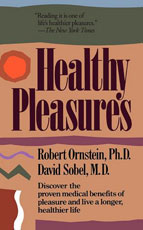Robert Ornstein, a psychologist, and David Sobel, director of a preventative medicine program, have written a watershed work on the vital role of pleasure in a healthy, well-rounded, and meaningful life. They open with the following scenario to consider:
"Imagine a world without pleasure. Life would appear colorless and humorless. A baby's smile would go unappreciated. Foods would be tasteless. The beauty of a Bach concerto would fall on deaf ears. Feelings like joy, thrills, delights, ecstasy, elation and happiness would disappear. The company of others would not bring comfort and joy."
Espousing what they call the "Pleasure Principle," Ornstein and Sobel spell out the many ways this endeavor can be nurtured through eating, drinking, family, music, friends, work, and helping others. The two enemies of those who pursue pleasure are the Puritanical ethic and the work ethic. One wants to punish the sinner and the other wants to keep him/her from unproductive activity.
Ornstein and Sobel state that there are two pleasure channels: one through the senses and the other through the positive mind. The authors salute the delicious pleasures that come through therapeutic touch where the heart rate slows and muscular tension diminishes.
There are countless small pleasures to be had with music that brings chills, movies that touch the heart, the helper's high that comes with serving others, the love for companion animals, and the simple delights of parenthood. Ornstein and Sobel conclude that whether we are regaining lost pleasures or going on a quest for new ones, our lives are enriched by these magical moments.
